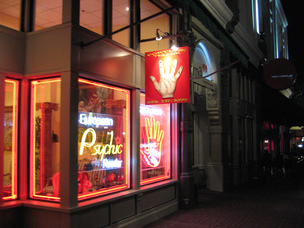
Who can see the future?
One common misconception about Santería is that it involves fortune telling, which gives rise to a lot of criticism and scorn from outsiders. For example, people who don't believe in the supernatural, the divine, or anything outside of empirical fact reject fortune telling as superstitious nonsense. They say fortune tellers are charlatans and crooks who prey on gullible people. Many Christians say that fortune telling is a sin because it challenges the notion that anyone or anything other than God knows what the future holds. They teach their children that fortune tellers are instruments of the devil. While everyone has a right to their own opinions, let's start with an important piece of information: Santeros/as and Babalawos aren't fortune tellers. They're priests. And divination, when done properly by people with the proper credentials and training, is a religious service through which God and God's messengers, the Orichas and the Egun (spirits of the dead) speak directly to the client through consecrated spiritual tools -- the dilogún (cowrie shells), the epule (babalawo's divining chain), the obi (pieces of coconut), or kola nuts.
Divination isn't a parlor game, and not just anyone can do it. For example, only Santeros/as who are fully initiated and who have trained to read the dilogún are able to cast the shells and do readings for clients. Many Santeros/as don't do dilogún readings (which are called consultas or registros) because dilogún reading requires extensive study and years of practice to master, similar to the way a rabbi might study the Torah. Some Santeros/as simply don't have the time, patience or interest to learn it, and some don't have that particular kind of aché (the gift, the talent or skill given by God). Babalawos, who are the priests of Orula, are among the most skilled diviners because Orula, among the Orichas, is the master diviner. Babalawos spend many years studying the odu (patterns) that can fall when they throw the epuele chain. They work under the guidance of elders and memorize vast numbers of patakis (sacred stories) and refranes (proverbs) that relate to each odu. The dilogún and the epuele chain have to be consecrated in special ceremonies, otherwise they don't have the aché to communicate with the Orichás. So, it's not just a question of going to the store, buying some shells, throwing them, and consulting a book to see what it all means. In many Lucumí communities, diviners carefully guard their knowledge of the odu because it's powerful and sacred information that shouldn't be shared with outsiders. Today, there are books on how to read the odu, but that's like giving a cookbook to someone who doesn't know how to cook, doesn't have the right tools, and doesn't know how to turn on the stove. It's only going to go so far.
Divination isn't a parlor game, and not just anyone can do it. For example, only Santeros/as who are fully initiated and who have trained to read the dilogún are able to cast the shells and do readings for clients. Many Santeros/as don't do dilogún readings (which are called consultas or registros) because dilogún reading requires extensive study and years of practice to master, similar to the way a rabbi might study the Torah. Some Santeros/as simply don't have the time, patience or interest to learn it, and some don't have that particular kind of aché (the gift, the talent or skill given by God). Babalawos, who are the priests of Orula, are among the most skilled diviners because Orula, among the Orichas, is the master diviner. Babalawos spend many years studying the odu (patterns) that can fall when they throw the epuele chain. They work under the guidance of elders and memorize vast numbers of patakis (sacred stories) and refranes (proverbs) that relate to each odu. The dilogún and the epuele chain have to be consecrated in special ceremonies, otherwise they don't have the aché to communicate with the Orichás. So, it's not just a question of going to the store, buying some shells, throwing them, and consulting a book to see what it all means. In many Lucumí communities, diviners carefully guard their knowledge of the odu because it's powerful and sacred information that shouldn't be shared with outsiders. Today, there are books on how to read the odu, but that's like giving a cookbook to someone who doesn't know how to cook, doesn't have the right tools, and doesn't know how to turn on the stove. It's only going to go so far.
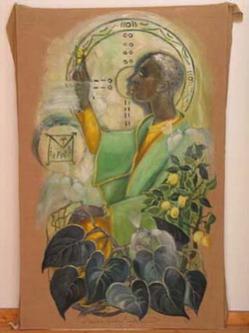
Orula is the master diviner
So, what is divination good for then? First, it's important to understand that in the Lucumí tradition, all humans are born with a destiny that is known only to God and his messenger Orula. We choose our own destiny by choosing the head that will be attached to our bodies when we come to earth. This is one reason the crown of the head is considered a powerful spiritual force in its own right, and the head needs to be protected. Santeros/as often cover their head with a white scarf or white cap; they don't like rain, the midday sun, the light of the moon to touch their heads; and they don't let other people touch their heads, either. Our head contains our destiny, and our head is vulnerable to outside influences. When we're born, we forget what destiny we've chosen for ourselves, and throughout our lives, we have to try to figure out what our destiny is and live in harmony with it. Consultas, or divination sessions, are one way to do that. Through the odu that falls on the mat, the Orichas speak and let the client know if all is going well (he has iré, blessings) or if there are problems (osorbo, obstacles). As a person works through and removes the obstacles, he comes more into harmony with his true destiny, and thus lives the life that God meant for him to have. Destiny exists as a concept in the Lucumí worldview but it is a destiny that allows free will. The individual chooses his own head (picking a good one or a bad one); in life, the individual can follow the advice given by the Orichas during consultas, or he can ignore them. At every turn, the individual chooses how he's going to live. He might make ebo (pay tribute to the Orichas, give them offerings) or he might refuse to make ebo. He can modify his behavior according to the advice given by the Orichas, or he can refuse to change. Questions like how long will a person live, will he be healthy and happy, will he be prosperous depend on the destiny that was chosen by that person before he came into the world, and the choices he makes during his lifetime. This is why it's not accurate to think of Lucumí divination as fortune-telling. It is more accurate to think of it as a mirror held up to show the individual what his life looks like, and what he can do to fix it, if there are problems.
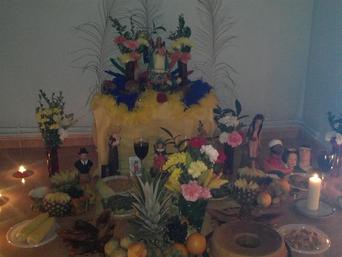
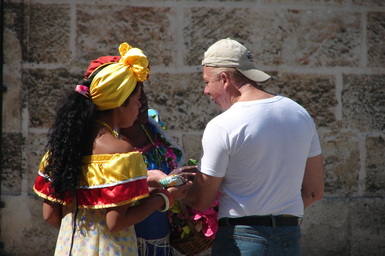
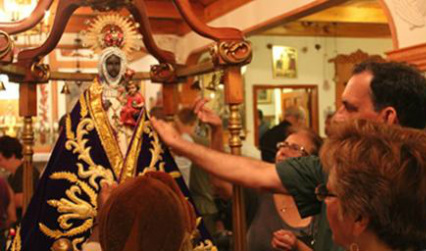
 RSS Feed
RSS Feed
